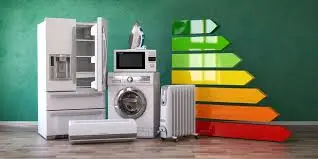10 Best Energy-Efficient Appliances for Your Home: Slash Your Bills!
In today’s world, electricity bills are constantly on the rise, and environmental concerns are growing. Fortunately, there’s a solution that benefits both your wallet and the planet: **energy-efficient appliances**! In this blog post, we’ll dive deep into the top 10 energy-efficient appliances that will significantly reduce your home’s energy consumption and save you money in the long run. You’ll no longer have to compromise on comfort while contributing to a more sustainable lifestyle. Ready to unlock the doors to energy savings? Let’s get started!
—
Why Are Energy-Efficient Appliances So Important?
**Energy-efficient appliances** are home devices that use less electricity than traditional models while delivering the same or even better performance. So, why are they so crucial?
- Lower Electricity Bills: The most obvious benefit is a significant reduction in your monthly electricity bills by cutting down your energy consumption. This translates to substantial financial relief, especially over time.
- Reduced Environmental Impact: Lower energy consumption lessens our reliance on fossil fuels used for electricity generation, shrinking your carbon footprint. This is a vital step in combating climate change.
- Longevity and Reliability: Often built with higher-quality components, energy-efficient appliances tend to last longer and experience fewer breakdowns.
- Government Incentives and Tax Credits: Some countries and regions offer incentives or tax credits to consumers who purchase energy-efficient appliances, helping to offset the initial cost.
—
The Top 10 Energy-Efficient Appliances for Your Home
Here are the most popular and effective **energy-efficient appliances** on the market to make your home more sustainable and economical:
1. Energy-Efficient Refrigerators
Refrigerators are one of the most energy-intensive appliances in a home because they operate 24/7. New-generation **energy-efficient refrigerators** consume far less energy thanks to advanced insulation technology, more efficient compressors, and smart sensors. “Energy Star” certified models, in particular, use 15-20% less energy than standard refrigerators.
- Tips: Don’t leave your refrigerator door open for long periods. Regularly check and clean the door seals. Avoid overfilling the refrigerator.
2. Energy-Saving Washing Machines
Washing machines that revolutionize water and energy saving use significantly less water and electricity than older models. Front-loading washing machines generally consume less water and energy compared to top-loading models. Additionally, many of these machines feature sensors that automatically adjust the wash cycle based on the load size and soil level.
- Tips: Wash your clothes at lower temperatures. Run the machine only when it’s fully loaded.
3. High-Efficiency Dishwashers
Dishwashers are another significant energy consumer in the kitchen. **High-efficiency dishwashers** utilize advanced spray technologies and sensors that optimize water and energy usage. Some models include “eco” or “auto” programs that adjust water and temperature based on the dishes’ soil level.
- Tips: Don’t run the dishwasher until it’s full. Load dishes directly without pre-rinsing to save water.
4. LED Lighting Systems
Compared to old incandescent bulbs, LEDs consume up to 80% less energy and last much longer. Switching an entire home to LED lighting can lead to a noticeable drop in electricity bills. Furthermore, LEDs are available in various color temperatures and brightness levels, offering greater flexibility in your lighting design.
- Tips: Turn off lights in rooms you’re not using. Smart lighting systems allow you to control your lights remotely.
5. Smart Thermostats
Heating and cooling account for the largest portion of home energy consumption. Smart thermostats help you save energy by learning your schedule or allowing remote control via your smartphone. They prevent unnecessary energy usage by automatically lowering or raising the temperature when you’re not home.
- Tips: Keep your thermostat at an optimal temperature. Ensure your windows and doors are well-insulated.
6. Energy-Efficient Water Heaters
Traditional water heaters constantly expend energy to keep water hot. Energy-efficient options like **tankless water heaters** or heat pump water heaters heat water only when needed, significantly saving energy. While their initial cost might be higher, they pay for themselves in the long run.
- Tips: Shorten your shower times. Don’t set your water heater temperature too high.
7. Energy-Efficient Ovens and Microwaves
Ovens and microwaves, other major kitchen appliances, have also been improved for energy efficiency. Convection ovens cook food faster and more evenly, saving energy. Microwaves, on the other hand, use significantly less energy than traditional ovens for heating small portions.
- Tips: Minimize preheating time for your oven. Use the microwave whenever possible for smaller tasks.
8. Smart Power Strips (Surge Protectors)
Even when turned off, devices consume a small amount of energy known as “phantom load.” Smart power strips automatically cut power to unused devices, preventing this unnecessary energy consumption. This is particularly beneficial for devices constantly plugged in, such as computers, televisions, and chargers.
- Tips: Unplug devices when not in use.
9. Solar-Powered Chargers and Outdoor Lighting
Though on a smaller scale, solar-powered chargers are excellent alternatives for mobile phones and tablets. Additionally, using solar-powered lamps for outdoor lighting not only reduces electricity bills but also offers ease of installation. These products help lower a home’s overall energy footprint.
- Tips: Place solar-powered products in areas that receive direct sunlight.
10. Energy-Efficient Air Conditioners (Inverter Technology)
During summer months, air conditioner usage can peak energy consumption. **Air conditioners with inverter technology** adjust compressor speed according to room temperature, operating more efficiently and saving significant energy compared to traditional units. It’s crucial to choose models with an A-class energy rating or higher.
- Tips: Don’t set your AC to excessively low temperatures. Have regular maintenance performed. Review your home’s insulation.
—
Frequently Asked Questions (FAQs)
—
Conclusion: Invest in Your Wallet and the Planet!
**Energy-efficient appliances** not only help you slash your electricity bills but also contribute to reducing your environmental footprint and fostering a more sustainable lifestyle. You’ll no longer have to sacrifice comfort while leaving a more livable world for future generations. Remember, even small steps can make a big difference!
Take the first step today to make your home smarter and more energy-friendly. You can start by researching the energy-efficient appliances that best suit your needs and budget. This investment in your future and our planet is a decision you won’t regret!



